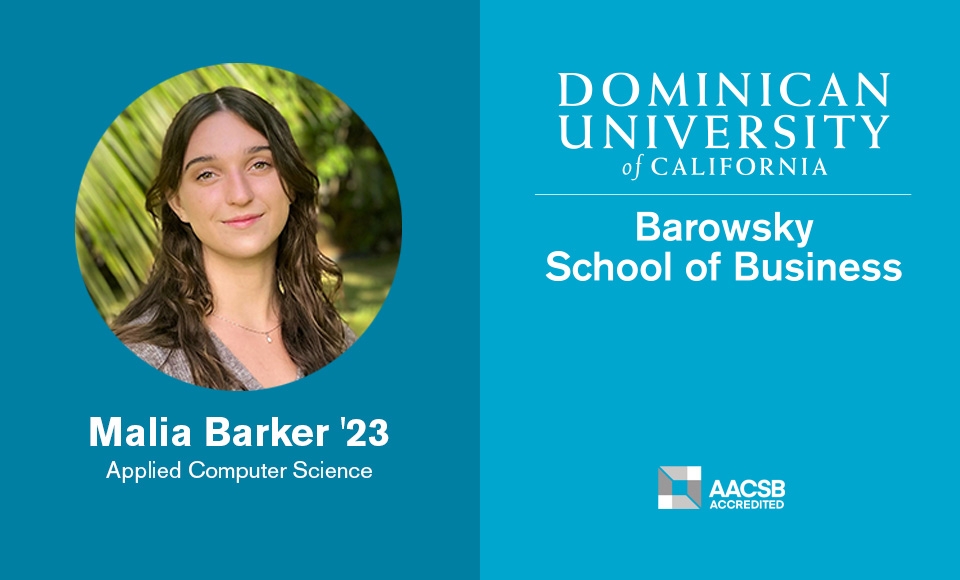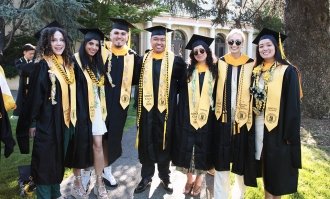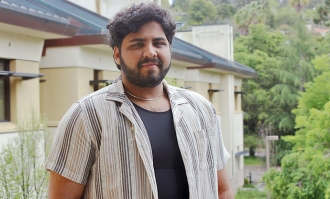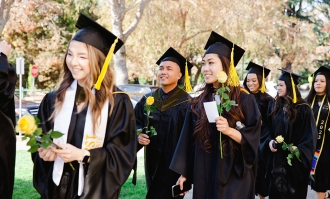- News
- News Archive
- Applied Computer Science Program Student Interning With NASA
Applied Computer Science Program Student Interning With NASA

Growing up in Hawaii, Malia Barker ’23 was fascinated by the stars, spending countless nights sitting on her roof and pointing out the constellations. By the time she was a senior at Kihei Charter School, Malia was working on astronomical research at the University of Hawaii Maui College.
“I took a class with a fellow classmate and two graduate students in which we researched star systems, updated database information, looked for outliers, and published a paper with our findings, Malia says. “It gave me the knowledge, resources, and inspiration for academics and astronomy that I still use today.”
Today, Malia is still looking at the stars – but this time from an entirely new perspective as an intern with the National Aeronautics and Space Administration (NASA). The internship allows Malia to combine the software engineering and web development skills gained as an Applied Computer Science (ACS) major at Dominican University of California with her love of science.
Her main project is creating a first-of-its-kind website that astrophysicists and other researchers can use to find the extreme ultraviolet (EUV) spectrum for a given star.
“The extreme ultraviolet spectrum is a set of specific wavelengths of light that cannot be observed by any instruments or telescopes,” Malia says. “The team I am working with uses a program called PHOENIX that simulates the atmosphere of a star and can give us a prediction of this specific part of the electromagnetic spectrum.”
The EUV light coming off of a star greatly affects the atmospheres of the planets around it.
“The website I am building allows researchers to submit either parameters of their target star -- like temperature, mass, gravity -- or input the name of their star and get back the computed EUV spectrum,” Malia says “This is not available in any way yet, and it will help a lot of people on my team with time, as they get asked for EUV spectra of stars from other research groups regularly.”
EXPLORE OUR UNDERGRADUATE PROGRAMS
Working at NASA was a long-time goal of Malia’s, so she was keeping tabs on the NASA job and internship board for opportunities that would fit her schedule. Opportunity knocked while she was standing on line for coffee.
“Over the summer, I was curious and checked again, and I found a great internship that was focused on software engineering and web development. I applied, not thinking anything of it, and a few days later as I was waiting in line for coffee at Starbucks, I checked my email and saw I got an interview. I was so excited I let out a little scream in the Starbucks line, it was fairly embarrassing but I didn’t care.”
In addition to her work developing the website, Malia is computing EUV spectra of M type stars using the PHOENIX code. She is helping with other parts of the EUV research, such as error calculations and reviewing spectral line emissions of spectra that have already been computed.
Earlier this year Malia for the first time attended the 241st meeting of the American Astronomical Society in Seattle. She presented an iPoster, which covered her current work with NASA and the PEGASUS web tool.
Her internship has provided opportunities for Malia to attend such conferences, meet with scientists within the NASA community, and attend meetings focused on current missions, including the James Webb Space Telescope.
“I’m learning about the environment and how research works within NASA and scientific communities in general. I would love to do research in the future with a team as well, especially research that combines astrophysics and computer science.”
Malia transferred to Dominican’s ACS program in the Barowsky School of Business after attending both Portland State University and Mesa Community College. At Portland State she was majoring in biochemistry with plans to go into genomic research.
“After the first semester I realized this wasn’t what I wanted to do and decided to save money and attend community college while I figured out exactly what I wanted to study, “ Malia says. “I moved to San Diego and attended Mesa Community college. There, I took an astronomy course that piqued my interest, but COVID hit and my classes were dropped.”
Malia continued to study general education courses then took the next semester off to work full time, save money, and really think about her next step in education.
Despite having no background in computer science, the ACS program caught her eye.
“This is when I found the ACS program and knew it was what I wanted to do,” she recalls. “I had no experience at all in computer science, but I had always been interested in the interdisciplinary fields of science. I wanted to study something that could be applied in every single field, and computer science is just that. Programming and the use of computers is something that every field can benefit from — and almost all of them do just that already.”
The ACS program gave Malia the ability to be fully immersed in applied computer science and quickly move onto the next steps in her career.
“I am excited that I have such a strong set of skills now and I will be graduating soon so I can take those skills and apply it to the field of astrophysics, a field which is already greatly benefiting from computer programs.”
SCHEDULE A CAMPUS TOUR
Malia has found mentors in the ACS program who are eager to help her advance her career goals.
“Aakash Sudhakar was a great instructor and is still an amazing mentor to me today. He allowed for a lot of flexibility and creativity in our data science courses,” Malia says. “I was able to dive deep into NASA exoplanet and meteorite databases for my projects, which helped me acquire my internship and helps me almost every day in what I do for this internship.”
Malia also enjoys working on intensives and the group collaboration projects in the software product development courses.
“This really helped me learn how to work hard and deliver projects fast, which is important. I also learned how to work on a team, collaborate, and communicate effectively, which are skills I use every day, especially in my internship.”
Malia is now applying to PhD programs with the help of her NASA mentor. Her goal is to study computational astrophysics, working with astrophysics, data science, and computer science.
“Overall, I would like to continue contributing to the scientific community with my own unique skills in computer science and astrophysics.”



